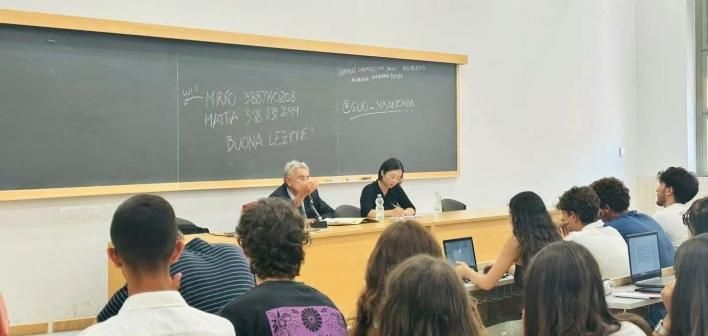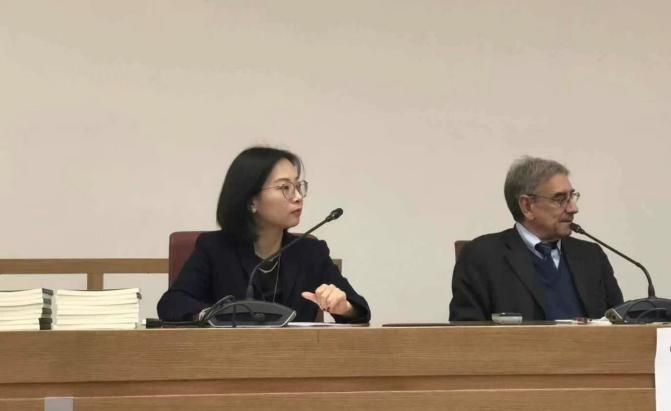Translating the People's Republic of China Civil Code into Italian, establishing the Center of Italian-Chinese Juridical Studies, founding the Sino-Italian College... Italian scholar Oliviero Diliberto and Chinese jurist Huang Meiling have collaborated to inject new vitality into the legal exchanges between China and Italy.
The story between them, transcending academic and cultural boundaries, is the epitome of cultural exchanges between China and Italy, and even between China and Central Europe.
Oliviero Diliberto, Dean of the Faculty of Law at Sapienza University of Rome and an authority on Roman Law, had his first encounter with China in the late 1990s.
In 1999, Diliberto visited China for the first time as Minister of Justice, engaging in in-depth discussions with members of China’s legal community. This visit sparked his strong interest in China’s innovations in rule of law following its reform and opening-up. So, he resolved to make long-term legal exchanges between the two countries. In 2000, appointed as a professor of Roman Law at Sapienza University of Rome, he began promoting legal cooperation between Italy and China.
Dillibeto: The first approach I adopted was to carry out training for young Chinese scholars who were dedicated to the study of law, especially Roman law. They came to the Sapienza University of Rome to study Italian, Latin and Roman law. Chinese scholars possess incredible talents.
Many Chinese students trained by Dillibeto have obtained doctoral degrees and become new forces in the international legal scholarship. Huang Meiling is one of them. At the Sapienza University of Rome, Dilliberto and Huang Meiling jointly established the Center of Italian-Chinese Juridical Studies and set up the “Library of Chinese Law”, which boasts the largest collection of Chinese legal classics in Europe.
Huang Meiling:Nowadays, many jurists from Europe come to the Sapienza University of Rome, and one of their purposes is to visit the Library of Chinese Law. On January 17, 2017, we established the Center of Italian-Chinese Juridical Studies, and PresidentMattarellaattended the founding ceremony.
Diliberto and Huang Meiling collaboratively published multiple series of books, and they led a team to translate PRC Civil Code into Italian. The publishing of the first Italian translation of the PRC Civil Code enabled the European legal academia to access and comprehend China’s civil legal system.
Diliberto: Many Italians living in China,as well as Chinese living in Italy, need to understand the local legal frameworks, including trade practices, contract formation, ownership, rights to usufruct, succession, estate, and related matters, all of which involve civil and commercial law. Promoting awareness of the PRC Civil Code among the Italian public is important economically and culturally.
The Italian translation of the PRC Civil Code has become a key achievement in Sino-Italian legal exchanges, receiving positive feedback upon publication, leading to a second edition.
Huang Meiling: Recently, while lecturing at the Ca'Foscari University of Venice, Iobserved that institutions of similar stature have also been paying attention to the PRC Civil Code, which is regarded as a representative achievement in China’s rule of law development.
Under the support of Deliberto, Huang Meiling actively promoted legal exchanges between China and Italy. In 2019, Huang Meiling facilitated the establishment of the Sino-Italian College through the collaboration between Sapienza University of Rome and Zhongnan University of Economics and Law, and served as its executive dean.She dedicated to cultivating highly qualified, interdisciplinary talents who are proficient in both law and foreign legal language proficiency.
Deliberto:Zhongnan University of Economics and Law has introduced courses from Sapienza University of Rome, allowing Chinese students to study locally. Meanwhile, Italian professors from Sapienza University of Rome have been rotating to teach in China on a periodic basis over the years, which is a historic achievement in cross-border academic collaboration.

Professor Deliberto (the first from the left) at Sapienza University of Rome
Deliberto:I often have mixed classes of Italian and Chinese students. The first thing I noticed was that they showed equal attention to and interest in certain aspects of the same subject. The Italian faculties who came to China with me soon became good friends with their Chinese colleagues andstill kept in touch afterwards, which shows that friendship has no boundaries.

In 2024, Deliberto won the Chinese Government Friendship Award for his outstanding contributions to legal exchanges between Italy and China.
Deliberto:This is truly unbelievable recognition—I'm absolutely thrilled. This is an acknowledgement of myself, of the work I have accomplished, and also of the efforts of the entire team. Over the course of my life, I’ve achieved many things, but receiving this recognition from China carries a weight of emotion.
This year marks the 55th anniversary of the establishment of diplomatic relations between China and Italy, as well as the 50th anniversary of the establishment of diplomatic relations between China and the European Union. In Diliberto’s opinion, China has paid great attention to the investment in scientific research and cultural studies, and achieved a series of innovative results.
Diliberto: I love my country and I hope that the relationship between Italy and China would become closer. As China is not only one of the most populous countries in the world, but also a country that focuses on educating the young people. In fact, China is nowadays the source of many of the great inventions and great innovations.
Huang Meiling was awarded the “Order of the Star of Italy” for her active contribution to the Sino-Italian legal exchanges. She said that in the future, based on the platform of Zhongnan University of Economics and Law and the University of Rome, she would continue to promote the professionalization and institutionalization of exchanges between China and Italy, cultivate more talents of composite type, and share the achievements of China’s rule of law with the world.
Huang Meiling: As quoted from an Italian writer, “Friendship is not a choice of chance, but the result of like-mindedness”, which explains perfectly the fruitful exchanges between China and Italy. Our two countries are culturally compatible, and our people’s hearts are also close to each other. Cultural exchanges need more bridges and more like-minded people to move forward. I am now trying to train my students, and I hope that I can follow in the footsteps of my teachers and continue to carry on the mutual understanding of Chinese and Italian cultures from one generation to the next, so that our cooperation can go on for a longer and more permanent period of time.
